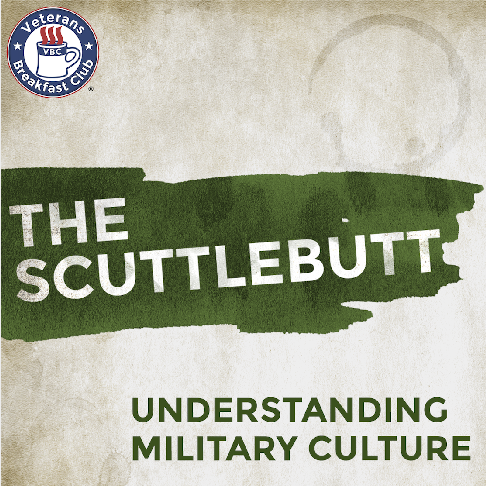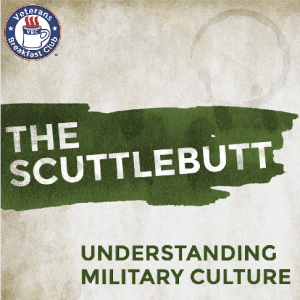
13.7K
Downloads
225
Episodes
Welcome to The Scuttlebutt, a weekly pre-recorded program presented by The Veterans Breakfast Club. “Scuttlebutt” is a military term (specifically Navy) for talk or gossip around the watercooler below decks. And this is what our program is all about: we have informed conversations about the military experience, past and present. We want to bridge the divide between those who serve and those who don’t. We look at headlines, we tackle important topics, and we ask questions. Join us on this journey of spreading the Scuttlebutt!
Episodes

Monday Mar 10, 2025
Conversation with Navy SeaBees
Monday Mar 10, 2025
Monday Mar 10, 2025
We call upon all former Navy SeaBees to join us for a conversation marking the 83rd anniversary of the founding of the U.S. Navy’s Construction Battalions on March 5, 1942. Formed in response to the urgent need for military construction forces capable of working under combat conditions, the Seabees have since established themselves as an indispensable part of U.S. military operations.
Before World War II, the Navy relied on civilian contractors to build bases and infrastructure. However, after the attack on Pearl Harbor and the U.S. entry into the war, it became clear that construction crews needed to be able to defend themselves. The solution was the formation of Naval Construction Battalions—skilled builders trained as combatants. The name “Seabees” comes from the phonetic pronunciation of the initials “CB.”
Seabees undergo rigorous training that combines construction expertise with military readiness. Initial training takes place at the Naval Construction Training Center in Gulfport, Mississippi, and Port Hueneme, California. Recruits learn essential skills like carpentry, plumbing, electrical work, heavy equipment operation, and demolition. In addition, they receive weapons training and instruction in defensive tactics, ensuring they can operate in hostile environments. Their motto, “We Build, We Fight,” reflects their dual purpose.
During World War II, Seabees were deployed to the Pacific and European theaters, constructing airstrips, roads, bridges, and bases under combat conditions. They played a key role in the island-hopping campaigns of the Pacific, building the infrastructure necessary for advancing U.S. forces. In the Battle of Guadalcanal, Seabees constructed Henderson Field, a crucial airstrip that enabled the Allies to gain air superiority. At Iwo Jima, they worked under constant enemy fire, repairing airfields to keep American planes in the fight. By the war’s end, Seabees had built over 400 advanced bases and countless facilities that proved essential to victory.
When the Korean War erupted in 1950, the Seabees were once again called upon to provide critical construction support. They built airstrips, roads, and supply depots in challenging environments. One of their most notable achievements was the rapid construction of an airfield at Wonsan, which played a key role in supporting Marine and Army operations. Seabees also repaired and maintained infrastructure in war-torn areas, showcasing their ability to work in extreme conditions.
In Vietnam, the Seabees operated extensively, constructing bases, airstrips, hospitals, and roads while also engaging in civic action projects. They built schools, hospitals, and bridges to help local communities, winning the support of Vietnamese civilians. One of their most daring projects was the construction of Khe Sanh Combat Base, a strategic stronghold. Seabees worked under enemy fire to complete the base, enabling U.S. forces to hold their ground during the pivotal siege of Khe Sanh in 1968.
Since Vietnam, Seabees have continued to play a crucial role in military and humanitarian missions worldwide. They built infrastructure in the Persian Gulf during Operations Desert Shield and Desert Storm, repaired damage from hurricanes and natural disasters, and provided disaster relief in Haiti and the Philippines. In Iraq and Afghanistan, Seabees built forward operating bases, roads, and medical facilities, ensuring U.S. and allied forces had the support they needed.
We’re grateful to UPMC for Life for sponsoring this event!

No comments yet. Be the first to say something!